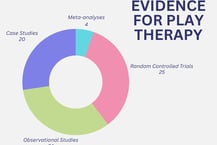
cGrowing Hearts and Minds Through Playc


RESEARCH
and
RESOURCES
The following pages are dedicated to providing links to current research and resources on play therapy, as well as printed and audio resources for parents and clinicians to learn more about themselves, parenting, and child development. Please contact us if there is an error with any links.


The Evidence Base for CCPT
CCPT is one of the most extensively researched interventions for addressing the social, emotional and behavioural challenges faced by children, many of which may be associated with their disability for which they access the NDIS.
There are five comprehensive meta-analyses that validate the efficacy of CCPT, two of which are highlighted here:
Bratton et al. (2005): Analysed 93 controlled outcome studies conducted between 1953 and 2000.
Lin and Bratton (2015): Analysed 52 controlled outcome studies conducted between 1995 and 2010.
These studies confirm CCPT as an empirically validated and highly effective approach, offering statistically significant and meaningful improvements for children facing a wide array of emotional and psychosocial challenges.
Summary of Key Findings:
Overall Effectiveness:
Bratton et al. (2005) demonstrated a large treatment effect size of 0.80, while Lin and Bratton (2015) reported a moderate effect size of 0.47. Both findings highlight CCPT’s statistically significant impact on children’s emotional and behavioural wellbeing.
Developmentally Appropriate for Young Children:
CCPT is particularly effective for children aged 7 years and younger, with an effect size of 0.53. Its design as a developmentally responsive therapy provides young children with a natural medium of expression through play.
Effectiveness Across Ages and Issues:
CCPT demonstrates adaptability and responsiveness across age groups, genders, and presenting concerns showcasing its adaptability and developmental responsiveness.
Key areas of impact include:
Global behavioural problems (effect size: 0.48)
Caregiver–child relationship stress (effect size: 0.59)
Self-efficacy and self-esteem (effect size: 0.63)
Processing and Emotional Regulation: CCPT allows children to process experiences and complex emotions using play as a natural form of communication, especially for children who struggle with verbalising their feelings due to age or developmental limitations.
Behavioural and Social Adjustment Improvements: CCPT is particularly effective in addressing behavioural challenges, enhancing social adjustment, and fostering emotional resilience, which are often critical concerns for parents, teachers, and caregivers.
💜 Privacy Policy 💜 Terms and Conditions 💜 Contact Us 💜 Feedback/Complaints 💜
Copyright © 2025 Seeds of Grace
Acknowledgement of Country
We acknowledge the Sunshine Coast Country, home of the Kabi Kabi and Jinibara Peoples, the Traditional Custodians, whose lands and waters we all now share. We pay our respects to Their Elders, past and present and acknowledge Their spiritual connection to Country.



Seeds of Grace is dedicated to fostering an environment that celebrates and respects the diversity of all individuals and families. We believe that every person, with respect for race, ethnicity, gender identity, sexual orientation, socioeconomic status, ability, or religion deserves equal access to quality care and support.




